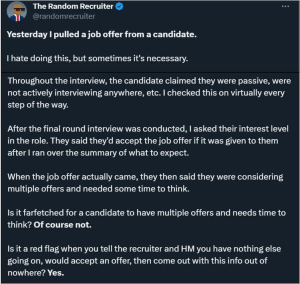When is it OK to rescind a job offer? That was essentially the question sparked by the below tweet (which has since been deleted).

When I told the Random Recruiter I was quoting them, they replied, “Awesome, looking forward to it! I don’t do this often at all, but sometimes it’s necessary to protect your rep w the hiring manager and to make sure they’re not left stranded.”
And that is a statement with which all recruiters can agree. An offer isn’t something that happens daily. But sometimes it has to happen. Here is what recruiters are saying.
Evaluating Reasons to Revoke
“A typical job interview is a conversation between two liars.” The origin of this idea is in question, but the reality of it is not.
Candidates lie about their skills. Hiring managers and recruiters lie about the responsibilities of the position. Crystal Vesely, manager of RFS training and communications at Global Credit Union, questions the Random Recruiter’s reasoning and advises that “lying” about interviewing elsewhere shouldn’t matter.
Vesely says that there are “two things candidates often lie about (and probably should) that a hiring manager should not care about, and should stop asking about: 1) if they’re interviewing elsewhere and 2) their current rate of pay.”
These things shouldn’t matter as they don’t affect the candidate’s ability to do the job. “If you find they’ve lied about things that actually matter,” Vesely adds, such as their experience, education, or other qualifications and aspects that may disqualify them from being eligible to work for your company, it makes sense to rescind. But “don’t pull an offer to a qualified candidate because they might have fibbed about something that trivial,” Vesely instructs. “It’s not an indicator of their overall morals or ethics.”
Like Vesely, Dollar Tree/Family Tree EEO specialist Rebecca Goldbach thinks this revocation is ill-advised. She says the candidate’s response simply means that you’ve “made an offer to an in-demand candidate in whom others see the same value you do. If you’ve made your best offer, give the candidate a few days and accept their decision. They might actually choose you. Pulling an offer comes with such potential legal liability that I would only pull the offer due to failing a drug test, background check, or if the company suddenly lost a contract or other funding source on which the position was based.”
The Legal Perspective
To Goldbach’s point, it’s important to be mindful of the legal rules around pulling an offer. Most employment in the United States is at-will, so it may seem odd to have legal worries about revoking an employment offer. After all, even if the position would be one governed by contract, the contract isn’t signed at this point, but as employment attorney Todd Stanton explains, “Pulling a job offer is an adverse employment action just like a termination. It can still serve as grounds for legal action.” Stanton adds that “once you realize that you don’t want someone to work for you, the sooner you make the decision to have them not work for you, the better.”
The reason you withdraw the offer matters, says employment attorney D. Scott Crook. For example, a candidate can “make claims for discrimination if they were in a protected classification and they claim the withdrawal was because of their protected status. Candidates can also claim damages for an alleged breach of contract or under the doctrine of promissory estoppel if the employer knew that the employee was moving from out of state and sold his or her home, quit a job, or made other significant financial decisions based on the job offer.”
In other words, you can’t revoke a job offer for the same reasons that you can’t terminate someone. If the reason for revocation is protected — even contents of a social media post can be protected in some states, according to Crook — you can’t revoke the offer.
Lead talent partner Bridget Keefer further suggests you revoke only in “specific circumstances like failed background checks, misrepresentation of qualifications, or changes in business needs.”
Avoiding the Need to Revoke in the First Place
In the Random Recruiter’s story, they revoked the offer after the candidate said they needed time to consider. Rosanel Rosario, an HR generalist at Brooks Brothers, tries to avoid ever needing to revoke in such a situation by giving deadlines to all candidates. “My offer letters would always include the date to accept by,” Rosario explains, citing three business days as her usual time frame.
Once three days pass, Rosario reaches out and says, “After further review, the team has decided to move in a different direction with another candidate” and wishes the candidate well. “It makes for a clean separation.”
Kimberly Patterson, an independent contract recruiter, agrees with the three-day rule. If she hears nothing by then, she’s much more likely to rescind an offer. “I need someone who wants the job,” Patterson says. “Actions speak louder than words.”
Remember That Candidates Are Humans
Revoking job offers can have lasting effects on not only the individual but on company culture.
A compliance coordinator who is currently job hunting and wants to remain anonymous feels like asking candidates to tell recruiters about their other job opportunities is a red flag. The individual explains: “A candidate shouldn’t even be asked if they are interviewing elsewhere. It should always be assumed that they are, and asking them outright puts them in a difficult and unfair position.”
Patterson agrees and cautions recruiters and hiring managers to look at things from the candidate’s side. She says about her time as a candidate: “During my time in Corporate America, I’ve had situations where I had a few back-to-back interviews and needed time to wait for an offer. Recruiters often forget what that’s like and take everything personally.”
Ultimately, the general consensus seems to be that revocation should be a rare thing. And that is something that candidates and recruiters can agree upon.
